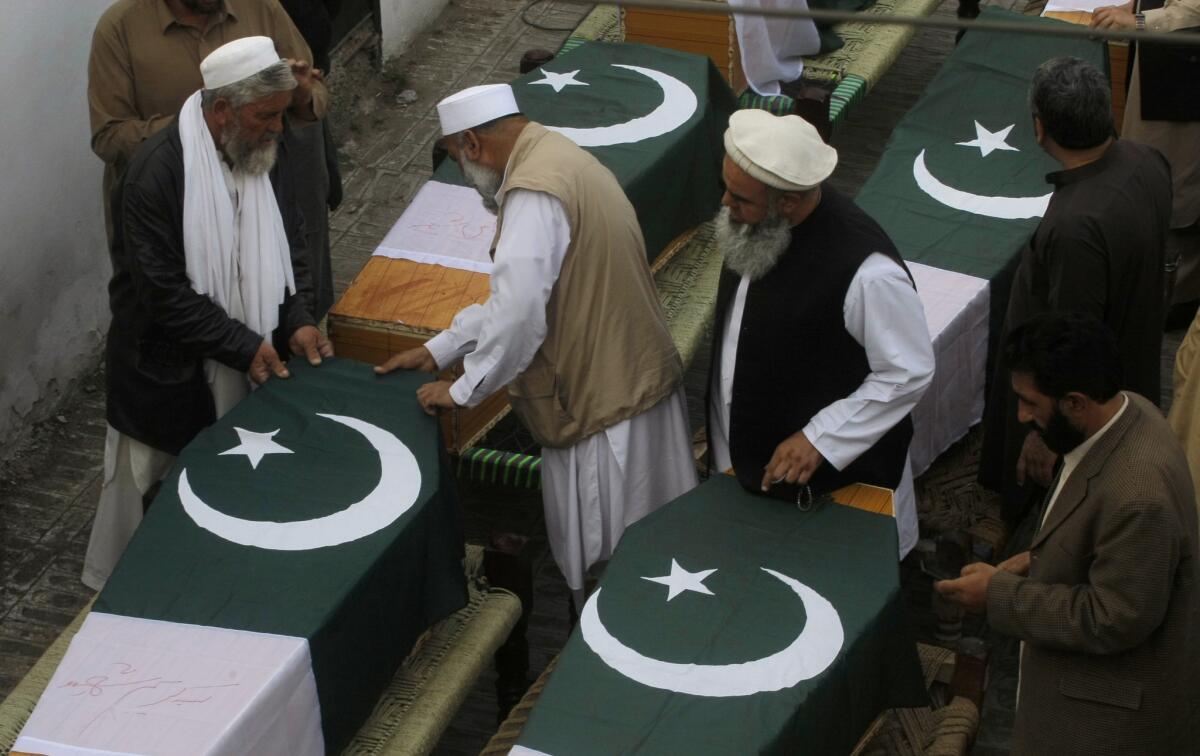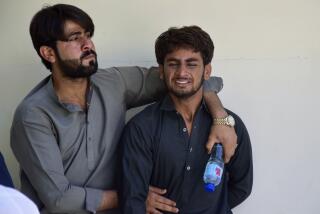Pakistani Taliban calls one-month cease-fire

- Share via
PESHAWAR, Pakistan -- The Pakistani Taliban on Saturday announced a one-month cease-fire in a move that could revive stalled peace talks with Pakistan’s government.
The militant group’s announcement came hours after two roadside bombs killed 11 security officers and a civilian and injured five others in the Khyber Agency tribal area. The attack was aimed at a polio vaccination team, a frequent target of the Pakistani Taliban and its allies.
Spokesman Shahid Ullah Shahid told reporters that the group, known by its Urdu name Tehreek-e-Taliban Pakistan, or TTP, would observe an unconditional cease-fire in the interests of the nation. “Outfits affiliated with the TTP should also abide by the decision,” he said.
The TTP was under growing pressure to declare a cease-fire after the Pakistan Air Force carried out several days of strikes on suspected hideouts of the group in the tribal area of North Waziristan. The Pakistani government stepped up its bombing campaign after suspending peace talks amid ongoing violence attributed to the insurgents, particularly in the provincial capital of Peshawar.
Pakistani officials claimed that the airstrikes killed more than 100 suspected militants, although the numbers could not be confirmed independently.
Interior Minister Chaudhry Nisar Ali Khan told reporters in the provincial capital of Peshawar last week that the insurgents must declare a unilateral cease-fire before talks could resume between government negotiators and representatives appointed by the Pakistani Taliban.
The head of the government negotiating committee, Irfan Siddiqi, told Pakistan’s Geo Television that the insurgent group’s announcement was “a big breakthrough,” the Associated Pres reported.
Hours before the announcement, however, the twin bombings against the polio vaccination team in the Jamrud tribal area outside Peshawar illustrated how difficult it may be for the insurgent organization to rein in allied militants.
Local official Ali Sher said that one roadside bomb hit a vehicle carrying guards who were on their way to provide security to health workers, wounding five of the guards. After the blast, authorities dispatched a vehicle to retrieve the injured when a second bomb planted along the road exploded, killing 11 guards and one passerby, a student, Sher said.
A three-day polio vaccination campaign in the tribal area began on Thursday, with officials saying that approximately 130,000 children under the age of 5 were to be immunized.
No group immediately claimed responsibility for the bombings, but Islamist militants have routinely attacked anti-polio teams because they believe vaccination campaigns are a cover for Western espionage. The government has dispatched guards to provide security to health workers.
Pakistan is one of just three countries where polio remains prevalent, particularly in Peshawar, the capital of Khyber Pakhtunkhwa province, according to the U.N. World Health Organization. So far this year, 22 new polio cases -- 19 from the tribal areas and three from Khyber Pakhtunkhwa -- have been reported in Pakistan.
Ali is a special correspondent.
More to Read
Sign up for Essential California
The most important California stories and recommendations in your inbox every morning.
You may occasionally receive promotional content from the Los Angeles Times.










